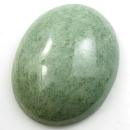|
|
|
|
Click on a letter above to view the list of gems. |
|
|
|
|
|
Jadeite
"Jade" |
|
| Chemistry: Na(Al,Fe3+)Si2O6 [Sodium Aluminum Iron Silicate] | |
| Discovered
in 1863;
IMA
status: Valid (pre-IMA; Grandfathered). | ||
|
| ||
|
Classification |
|
|
| |
|
Silicates | |
|
8/F.01-130 | |
|
|
9 : SILICATES (Germanates) |
|
Related to: |
Pyroxene Group. Clinopyroxene Subgroup. |
|
|
|
|
Crystal Data |
|
|
|
|
|
Crystals rare, prismatic, showing cleavage faces to 1 cm. Commonly massive, or fibrous, granular, compact. |
|
|
Single and lamellar twinning on [100] and [001]. |
|
|
|
|
|
Physical Properties |
|
|
|
|
|
[110] Distinct/Good |
|
|
Splintery, Fibrous |
|
|
Tough, difficult to break appart |
|
|
6.0 - 7.0 |
|
|
3.24 - 3.43 (g/cm3) |
|
|
None |
|
|
Not Radioactive |
|
|
|
|
|
Optical Properties |
|
|
|
|
|
Apple-Green, Emerald-Green, Bluish Green, Leek-Green, Greenish White, White, rarely Blue or Violet |
|
|
Translucent to Sub-Translucent |
|
|
Sub-Vitreous; may be Pearly on cleavages |
|
|
1.654 - 1.693 Biaxial ( + ) |
|
|
0.0130 - 0.0200 |
|
|
Moderate to Strong; r > v |
|
|
Weak; X = colorless or green, Y = colorless or yellowish green, Z = colorless or yellow |
|
|
|
|
|
Occurances |
|
|
|
|
|
Geological Setting: |
In high-pressure metamorphic rocks of the glaucophane facies; a component of eclogite. |
|
Common Associations: |
Albite, Analcime, Aragonite, Calcite, Glaucophane, Muscovite, Omphacite, Quartz, Zeolites |
|
Common Impurities: |
Ti, Mn, Mg, Ca, K, H2O |
|
Type Locality: |
Tawmaw, Myitkyina-Mogaung district, Kachin State, northern Myanmar (Burma) |
|
Year Discovered: |
1863 |
|
View mineral photos: | |
|
|
|
|
More Information |
|
|
|
|
|
| |
|
| |
|
The name Jade refers to either of two mineral species, Jadeite and Nephrite. These two minerals have no relation to one another except for appearance. Jadeite, which is often confusingly refered to as "Chinese Jade", was discovered in Burma (Myanmar) in 1863. Nephrite has been used by the Chinese for tools, beads and carving of decorative and usefull objects for over 7000 years. The Chinese call their Nephrite "Jade" yu and therefore Jadeite was not the chen yu, or true Jade. Nephrite from China is often refered to as "Yunan Jade" from its source in the Yunan Province, China. The name Jade is from the Spanish phrase piedras de ijada meaning stone of the side (or possibly stone of the loins) because it is supposed to cure kidney ailments if applied to the sides of the body. This myth may have come from the shapes of the river worn, tumbled Jadeite pebbles having shapes similar to kidneys. When the Spanish phrase piedras de ijada was translated into French it was pierre de l'éjade. A printing error when the name first appeared in French made it pierre de le jade, which was simply abreviated to Jade by the English. Jadeite
can be found in small amounts at many localities. Some
well-known localities are: around Tawmaw, Myitkyina-Mogaung
district, Kachin State, northern Myanmar (Burma); in
the Ohmi area, along the Hashidate and Kotake Rivers,
Niigata Prefecture, and at Shibukawa, Gumma Prefecture,
Japan; around Lake Baikal, Siberia, Russia. In the USA
in California, as crystals in boulders along the Russian
River near Cloverdale; at several places in Mendocino
County; at Clear Creek, near New Idria, San Benito County.
|
|
|
We
have not photographed our Jadeite gems. Please
check back soon. |
